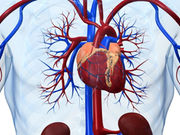Cardiac, cerebrovascular events lower in patients with multivessel coronary artery disease
TUESDAY, Dec. 12, 2017 (HealthDay News) — In patients with diabetes and multivessel coronary artery disease (MV-CAD), coronary artery bypass grafting (CABG) may be the preferred method of revascularization, with lower rates of major adverse cardiac or cerebrovascular events (MACCE), according to a study published in the Dec. 19 issue of the Journal of the American College of Cardiology.
Krishnan Ramanathan, M.B., Ch.B., from University of British Columbia in Vancouver, Canada, and colleagues assessed the generalizability of results from the FREEDOM (Future Revascularization Evaluation in Patients with Diabetes Mellitus: Optimal Management of Multi-Vessel Disease) trial in real-world practice among patients with diabetes mellitus and MV-CAD by evaluating major cardiovascular outcomes in all patients with diabetes who underwent coronary revascularization between 2007 and 2014 (4,661 patients; 2,947 with ACS).
The researchers found that at 30 days after revascularization, the odds ratio for MACCE for ACS patients favored CABG (odds ratio, 0.49; 95 percent confidence interval [CI], 0.34 to 0.71), whereas among patients with stable ischemic heart disease (SIHD), MACCE was not impacted by revascularization strategy (odds ratio, 1.46; 95 percent CI, 0.71 to 3.01; Pinteraction < 0.01). Over the longer term (median follow-up of 3.3 years), the benefit of CABG over PCI no longer varied by acuity of presentation (hazard ratio for MACCE in ACS and SIHD patients, 0.67 [95 percent CI, 0.55 to 0.81] and 0.55 [95 percent CI, 0.40 to 0.74], respectively; Pinteraction = 0.28).
“A well-powered randomized trial of CABG versus PCI in the ACS population is warranted because these patients have been largely excluded from prior trials,” the authors write.
Copyright © 2017 HealthDay. All rights reserved.








